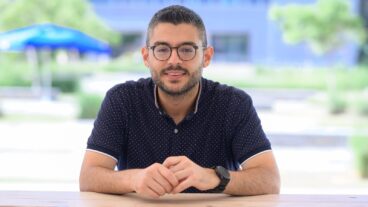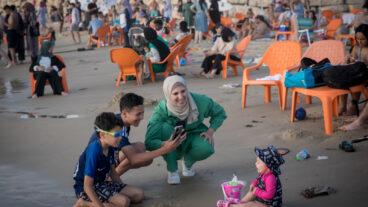It’s been a long, winding road that has taken 39-year-old Israeli extreme athlete Dror Cohen from combat planes to a wheelchair to the 2008 Paris-Dakar Rally, the world’s toughest off-road race.
By his own admission, Cohen has been a daredevil since he was a boy. “Whenever we had trips, I never went on the track, I always went off-road,” he told ISRAEL21c.
As he grew up, Cohen continued to seek out physical challenges, becoming an army combat pilot (F-16s and Skyhawks) and flight instructor. But then tragedy struck: an army car accident in 1992 left Cohen, then 24, paralyzed from the waist down. It seemed that his active days were over, and he would be relegated to a life of immobility.
At first, Cohen went into a dismal depression over his condition. Slowly, however, he began to exercise again, participating in the basic sporting activities that were available for the disabled. And then, while abroad, Cohen had the opportunity to try out skis and water-skis adapted for the disabled, and was thrilled to return to the adrenaline-producing sports that he loved.
“I need adrenaline; if I don’t have it sucked into my blood, I lose interest very quickly,” he explained.
But when he returned home to Israel, he found that extreme sports facilities for the disabled were not available.
“You can go to these ghettos where all the disabled go to. There’s a nice basketball place, swimming pool – that’s it!” recalled Cohen.
“I brought water-skis from London and learned everything there is. I came back and I wanted to water-ski, but I was told ‘Go, go we don’t have anything for you.’ Or when I wanted to sail, or scuba-dive; I was told ‘we don’t deal with disabled.’ We just saw that there is no real answer for disabled people who want to do extreme sports.”
Owing to his nature of action, the frustrated Cohen helped found the Challenge Association in 1995. The organization’s goal is to make extreme sports available for the disabled, including the deaf, blind, people with cerebral palsy.
According to Cohen, the association offers “everything in the air, sea and land that you can think of.” And as a result, thousands of registered disabled Israelis are now enjoying activities that were previously unavailable to them – like sailing.
“They put them in the boat with special trainers, a lot of volunteers. Who would previously give a blind person a chance to go sailing in a boat?” he asks. “Then Challenge comes in and proposes: come and sail.”
Yet for Cohen himself, participating in extreme sports wasn’t enough: he needed to compete. He trained with a sailing team, placing 8th in the 2000 Paralympics, and went on to take the gold in Athens, in 2004. But even that wasn’t enough, and today Cohen is gearing up to take on the infamous Paris-Dakar race.
“The race is the hardest off-road race in the world: almost three weeks, 10,000 km of racing. We start in Lisbon in Portugal, cross to Africa, Morocco, Mauritania, Senegal, and each day drive between 600 to 800 kilometers,” he said.
Two contestants died in the 2007 event in January, which also requires scaling Saharan sand dunes 300 feet high. But Cohen is not deterred.
“For me it was a dream from when I was a child. I always loved motor sports and nature. I just love doing it.”
He attempted the Paris-Dakar race in 2002, but had to drop out after the 11th day, when his engine gears burned up. Now he is busy training, and raising money to represent Israel this coming January. Sponsored in part by UMI General Motors, who have also provided his souped-up Chevrolet Silverado 2008, Cohen still needs to raise $300,000 in order to compete.
An entrepreneur in addition to an extreme athlete, Cohen launched a website where people can buy a square on the hood of his car, and can post photos and messages which will be part of the desert race.
Even when not driving, it’s a challenge just to survive the race, explained Cohen.
Between stretches of driving, participants must camp out in the Sahara desert, which is difficult enough for an able-bodied person, but poses an added obstacle for him. “It’s hard on a wheelchair, it doesn’t really go on the sand,” he said.
But, he adds, his motivation derives from the push he may give to other disabled people.
“The fact that someone in a wheelchair goes and races able-bodied people in the hardest off-road rally in the world, sleeping in tents in the Sahara, gives motivation to a lot of people to move themselves up. If I, a person in a wheelchair, goes and fights the desert, maybe you can do something for your community, your family.”
Cohen is not interested in special dispensation for his disabilities. “I compete with the regular people,” he says proudly. “I race them, and I win. Whoever is the best and the fastest wins.”
An additional motivation for Cohen is representing Israel abroad.
“I’m proud of it, we’re going to be the only Israeli team this year. It’s nice to be Israeli in a Muslim country like Mauritania, and be proud of it. And they give you respect.”
Cohen admits that his family and friends worry about his daredevil lifestyle, but says that they’ve reached an understanding.
“My mother learned: if you can’t beat them, join them,” he grins. “They know that’s what makes me happy. I’m privileged to understand what makes me happy, and that’s how I live. I love racing. I love winning. I don’t know what defeat is.”
Cohen spread messages like that during last summer’s Second Lebanon War, talking with injured soldiers in rehab, and their families.
“People die, and they’re finished. If you’re here, I say, come on, move yourself. Life is too short and too cruel sometimes, if you don’t take advantage of things you understand you have. Dror means ‘sparrow.’ So I’m a free sparrow. I hope forever I’ll be a free sparrow.”












